Nearly everybody seems to have their personal way of thinking about Unveiling the Hot Trend: The Benefits of Tankless Water.

In a globe where benefit and effectiveness reign supreme, it's no surprise that home owners are regularly looking for smarter ways to manage their home's energy consumption and comfort. One development that has steadily gained appeal is the tankless hot water heater. But exactly what makes these systems stand apart from the traditional tank-based versions the majority of us grew up with? Allow's dive in and discover the advantages of tankless water heaters, helping you determine if it's time to make the switch in your house.
Intro
Image this: you enter the shower after a long day, expecting a relaxing waterfall of hot water, just to be welcomed by icy droplets due to the fact that the last person utilized everything up. Audio familiar? Traditional water heaters keep a set amount of warm water, suggesting you go to the grace of that container's supply. Tankless systems, on the other hand, warm water on demand. No more running out mid-shower, no more fumbling with timetables just to ensure hot water is offered.
Comprehending Tankless Water Heaters
What Are Tankless Hot Water Heater?
Tankless hot water heater, sometimes referred to as on-demand or instantaneous hot water heater, give warm water only as it's needed. Rather than keeping gallons of pre-heated water, these systems kick into action the minute you turn on the tap. Water travels through a warmth exchanger, heating up in real-time, implying you obtain a nonstop flow of hot water without the demand for a large container sitting idly by.
How Do They Vary from Traditional Systems?
Typical heating units hold a reservoir of warm water, making use of power to maintain that container at a constant temperature. Tankless systems remove the standing supply, minimizing wasted power and the cumbersome impact of a big cyndrical tube. Basically, you're upgrading from a "accumulation" mindset to a "made-to-order" method.
Typical Types of Tankless Units
Tankless water heaters typically are available in 2 selections: gas and electrical. Gas versions often tend to deliver greater flow rates, suitable for bigger households, while electrical models typically serve smaller homes and are typically less complicated to set up. Additionally, some systems are developed for point-of-use (serving one component) while others can deal with the entire home's hot water demands.
Key Benefits of Tankless Hot Water Heater
Energy Efficiency and Price Savings
No more heating a titan storage tank's well worth of water and maintaining it toasty all the time. Tankless heating units reduce standby energy losses, which can reduce energy costs. While the preliminary cost could be greater, the lasting cost savings typically justify the investment.
3. Space-Saving Layout
If your home is short on storage space, getting rid of the bulky tank maximizes beneficial room. Tankless devices are compact and can commonly be placed on wall surfaces, tucked away in corners, or set up in tight energy wardrobes without gobbling up the whole room.
4. Longer Life expectancy
A well-kept tankless water heater can outlast its tank-based relative. Standard storage tanks may last 10-15 years, while tankless designs can maintain chugging along for two decades or even more, making them a strong investment with time.
1. Countless Warm Water Supply
Ever had to set up showers so everybody gets their fair share of hot water? With tankless, that comes to be a thing of the past. As long as the heating system's circulation capability isn't gone beyond, you can take back-to-back showers without becoming a popsicle.
5. Improved Water Quality
Keeping water in a container can sometimes result in sediment accumulation or a slightly "off" preference. With tankless systems, fresh water is heated up on the spot, lowering the possibilities of debris build-up and potentially offering cleaner-tasting water.
Factors to consider Prior To Changing
Though the advantages are compelling, it's smart to think about a couple of factors before fully committing.
Assessing Your Home's Water Usage Patterns
If your house at the same time makes use of several fixtures with high warm water need, see to it the device's flow price fulfills your needs. Knowing your usage patterns helps you select the right size and type of tankless heating unit.
Upkeep and Care Tips
Tankless systems are reasonably reduced maintenance, but they aren't set-it-and-forget-it devices.
Regular Cleaning and Descaling
Difficult water minerals can develop in the warmth exchanger, affecting performance. Routine descaling (typically advised annually) keeps the unit running at peak performance.
Annual Expert Evaluations
A yearly checkup from a specialist ensures small problems are captured early. They'll analyze the device's efficiency, seek leakages, and assist preserve optimal effectiveness.
Initial Investment Prices
Tankless heating systems normally feature a greater in advance price. In between the unit itself and potential installation modifications, the initial expense might offer you sticker shock. Yet bear in mind to watch it as a long-lasting investment.
Setup Requirements
Relying on your home's facilities, you might require additional electrical ability or gas line upgrades. Ensure you recognize the installation needs and speak with a professional to prevent surprises.
Ensuring Correct Air Flow
For gas models, proper air flow is important to safely expel exhaust gases. Make certain venting systems are clean and correctly installed to stop any type of possible safety and security risks.
Contrasting Different Brands and Models
Not all tankless hot water heater are developed equal.
Investigating Trusted Producers
Seek reliable brands with a history of generating quality units. A dependable producer typically offers far better consumer support and longer warranties.
Installment: DIY or Specialist?
While some property owners relish tackling jobs themselves, tankless installation may not be the most effective time to break out the tool kit.
Pros and Cons of Do It Yourself Installation
A DIY mount can save money, yet it comes with dangers. Inaccurate installment can lead to ineffectiveness or safety problems. If you're handy and have experience, it could be viable-- but proceed with caution.
Reading Evaluations and Customer Feedback
Customer evaluations and responses from neighbors or friends that have actually gone tankless can use valuable insights. In some cases, real-life experiences can be extra informing than advertising and marketing pamphlets.
When to Call a Professional Plumbing Technician
For many, calling a pro makes certain whatever's done properly. A professional plumbing technician understands neighborhood codes, sizing requirements, and airing vent parameters, minimizing the risk of incidents.
Maximizing Effectiveness
You have actually bought a tankless unit-- now optimize its performance.
Optimal Temperature Settings
Most people set their systems in between 120-140 F. Readjusting the temperature level can improve convenience and cost savings. Experiment to locate a pleasant place that doesn't throw away power.
Coupling With Low-Flow Fixtures
Wish to extend your unit's abilities? Think about setting up low-flow showerheads and faucets. They lower water use, enabling your tankless system to deliver a steady stream of warm water without stressing.
Environmental Effect
Tankless water heaters straighten with greener living goals.
Reduced Carbon Impact
By using less power and only home heating water as required, tankless systems can reduce your home's carbon impact, minimizing your environmental influence.
Conserving Natural Resources
Much less energy usage and much less squandered warm water translate right into less natural resources being utilized, an ecological win-win.
Who Profits The Majority Of from Tankless Heaters?
The appeal of tankless heating systems is that they can suit a variety of households.
Huge Families vs. Solitary Residents
Huge family members might love the limitless warm water supply, while solitary owners value the power financial savings from not warming a whole storage tank for just one person's morning shower.
House Owners with Restricted Space
If your home is short on square video, shedding the large tank liberates space for other essentials-- or possibly just more breathing space.
Eco-Conscious Consumers
Going tankless aligns with eco-friendly worths, ensuring you're not throwing away energy or sources.
Future Trends in Tankless Hot Water Heater
The world of home devices is ever-evolving, and tankless water heaters are no exemption.
Developments in Innovation
R&D is continuously enhancing warmth exchangers, making systems much more efficient and resilient. Future versions could be also quieter, much more portable, and much better suited for varying climates.
Smart Home Integration
Envision adjusting your hot water heater's temperature using an application or obtaining upkeep alerts on your phone. As smart home technology advancements, we'll see more connectivity and benefit.
Final thought
Choosing a tankless water heater is greater than simply upgrading your home's warm water system; it's investing in lasting convenience, energy efficiency, and a greener way of living. By considering your home's water usage, bearing in mind setup requirements, and devoting to routine upkeep, you can take pleasure in a stable stream of warm water without the luggage of a bulky container. As technology progresses, you can eagerly anticipate even smarter, more efficient tankless solutions that not just make your life easier however additionally benefit the earth.
5 Benefits of Tankless Water Heaters
Save Valuable Space
Since tankless water heaters do not have a massive 40+ gallon tank of water, they are considerably smaller and can fit in more narrow spaces in your home.
If you are working with limited square footage, a tankless water heater will still provide you with the hot water you need while taking up significantly less space in your home. While the exact size of a tankless water heater varies depending on the brand, some are as small as a carry-on suitcase.
Endless Supply of Hot Water
While a traditional water heater preheats and stores your water in the tank, tankless water heaters do not rely on a reservoir system.
This means that they do not run out of hot water like traditional water heaters since they make hot water as needed. Traditional water heaters need to stop and reheat water when the tank inevitably runs out, but tankless water heaters do not have this issue.
Provide Warm Water On-Demand
As mentioned above, tankless water heaters do not preheat a certain amount of water and then store it in a massive tank to be used later. An advantage of installing a tankless water heater includes water being heated instantly whenever you turn on the faucet.
When you turn on the water, it will travel through a heat exchanger in the unit and be heated with either an electric element or a natural gas burner. Gone are the days of having to ration out your hot water to make sure that you do not run out.
Longer Life Cycle
Not only do tankless water heaters provide an endless supply of hot water for your home whenever you want it, but these units tend to have a longer lifespan than water heaters with tanks.
Tanked water heaters have an average lifespan of around 10 years, as the tank is prone to corrosion, leading to serious issues. In comparison, tankless water heaters can last for around 15 to 20 years with the proper maintenance and tune-ups.
Energy Efficient
Compared to traditional water heaters, tankless water heaters are a more energy-efficient water heating option for your home. Tank water heaters must heat and reheat the water stored in the tank throughout the day, even if you are not home.
This energy use adds up over time, leading to an increase in your energy bills and added strain on your unit. A benefit of buying a tankless water heater includes saving money since it only operates when you turn on the hot water. Since it only heats up as needed, this can decrease your energy bills and save you money in the long run.
https://callrandazzo.com/blog/5-benefits-of-tankless-water-heaters/

We were made aware of that editorial about from a buddy on another website. Remember to pause to promote this content if you liked it. Thank you so much for your time spent reading it.
Book Service Now